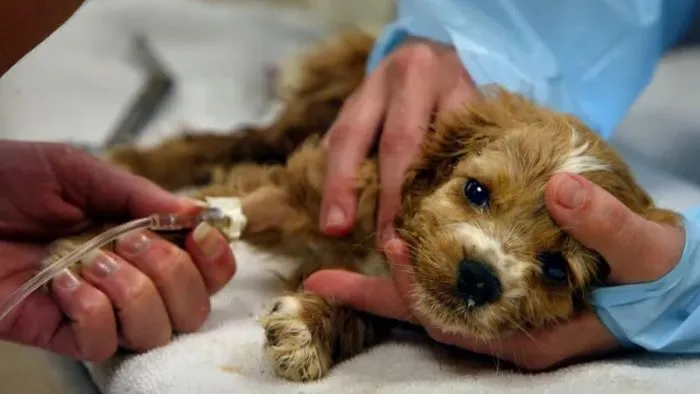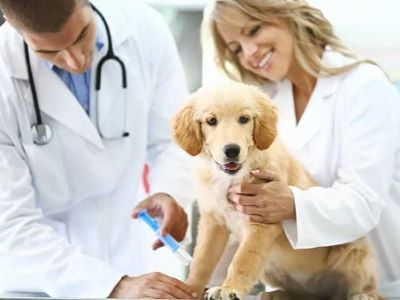If you have a pet then your major concern may be the illness whether it is related to you or your pet. You might be concerned that what if your illness gets transmitted to them and theirs to you? If the illness is as fatal as parvovirus then the concern has no bounds. To clear your doubt, here in this blog, ‘Can a human get parvo from a dog?’ we will try to provide you with every information related to it.

Can a Human Get Parvo From a Dog?
No, a human cannot get parvo from a dog. The strain of parvovirus in humans and canines is different which makes it impossible to spread from dogs to humans. Also, parvovirus being species-specific cannot be transmitted from one species to another.

The human strain of parvovirus is called human parvovirus[2] B19 and the canine strain of parvovirus is called canine parvo. Though humans cannot get parvo from a dog, still they can act as a carrier.
Dogs cannot spread parvo to humans but if the human comes in contact with an infected dog and comes in contact with other dogs they are likely to spread parvo in them.
What Is Parvo and How Does It Affect Dogs?
Parvo is a virus is a fatal belonging to the Parvoviridae group. It can infect animals as well as humans. The parvo specifically infecting the canine is called CPV canine parvovirus[1].
The CPV canine parvovirus has two variants CPV-2a and CPV-2b. The canine parvovirus is non-enveloped means one that lacks a bilayer.
Parvo in canines spreads when a healthy dog comes in contact with an infected dog’s faeces. The virus tends to survive in the environment for a longer period thus it can transmitted in this way too.
In dogs, the parvo mainly affects their gastrointestinal tract and bone marrow. Parvo affects a dog’s intestinal lining by damaging it and enabling the absorption of nutrients and minerals.
White blood cell which helps to protect against the diseases are also targeted by canine parvovirus.
What Are the Symptoms of Parvo in Dogs?
The fatal parvo has an adverse effect on the dog’s health. Parvo affects the dog’s gastrointestinal tract, white blood cells and the bone marrow. Here are symptoms to identify parvo in dogs:

Tiredness
A dog infected with parvo becomes less active and gets tired easily. If you notice any physical changes in a dog, like showing no interest in playing, sleeping all day, or no zoomies then don’t take it light-heartedly.
Loss of appetite
For a dog infected with parvo, loss of appetite is common. Your dog may not feel like eating anything. He will eventually lose interest in eating and will stop eating the food.
A dog due to many reasons feels a loss of appetite but if it continues for a longer period then you should consult a vet immediately.
Fever
If your dog is having a high fever and it prevails for a longer period then it can be a sign of canine parvovirus. The dog’s normal body temperature is between 101-102 F. If you notice a fever higher than that, it means your dog is having a fever.
To know whether your dog has a fever or not check his ears and nose. If the dog’s ears are heated and their nose is dry then it is the sign of fever. Further, you can also use a thermometer to check the fever.
Weight loss
Parvovirus affects the dog’s intestinal tract, enabling them to digest the food and absorb the nutrients. Due to this reason, the dog starts losing weight.
That is why it is important to keep a check on a dog’s weight, it helps to identify any irregularities in your dog’s body
Vomiting and diarrhoea
As the parvovirus affects the dog’s intestines by destroying its stomach lining, your dog may suffer from diarrhoea and vomiting. You may even notice a trace of blood in your dog’s diarrhoea.
Due to frequent vomiting and diarrhoea, your dog may get dehydrated which is not a good sign so try to keep your frequently hydrated,
Anaemia
In anaemia, the count of red blood cells decreases. A dog suffering from parvo loses blood in stool which leads to anaemia. Anaemia further decreases the reach of oxygen to tissues.
Anaemia leads to pale gums, restlessness, and irregularity in breathing in dogs.
How Is Parvo Transmitted?
The parvovirus has various strains and their ways of transmission are also different. The canine variant of parvovirus transmits through contact with infected dogs and the environment.
If a healthy dog comes in contact with the infected dog’s feces then he is likely to catch the virus. Parvovirus can live in an environment for a longer time, especially on soil and water transmitting it to other dogs.
Even humans can be the carriers of parvo. If you come in contact with an infected dog, the virus remains with you and can be spread to other dogs too. Puppies and unvaccinated dogs are at the most risk of catching parvo.
As mentioned by Dr. Sarah Wooten in bechewy, "If your dog has been diagnosed with parvo, she should be isolated from all other dogs in the household until she has completely recovered. All bedding, food and water bowls and flooring should be disinfected with a disinfectant such as a dilute bleach solution, which eradicates the virus from the environment."
What Is the Difference Between Canine Parvovirus and Human Parvovirus B19?
Here’s how canine parvovirus and human parvovirus B19 are different from one another:
- Human parvovirus B19 affects and is transmitted to only humans no other specific species, whereas the canine parvo can be spread to wolves and hyenas too.
- The symptoms of canine parvovirus are loss of weight, fever, vomiting, diarrhoea, loss of appetite and so on. The symptoms of parvovirus in humans are rashes, fever, headache, upset stomach, runny nose, sore joints and anaemia.
- Canine parvo is more fatal and cannot be cured in most situations. It also requires special and proper medical care and treatment. Human parvovirus is not very fatal and can be cured without any extensive medical treatment.
How To Prevent and Treat Parvovirus in Dogs?

Vaccinate your dog
It is really important to vaccinate your dog. Vaccination provides your dog protection against fatal diseases. Usually, the vaccination in puppies starts as early as 6-8 weeks followed by booster shots till 16 weeks.
After the 16th week, the dog will then receive vaccinations annually. Vaccination protects your dog from rabies, parvovirus and many other life-threatening diseases.
Limit dog’s exposure
Limiting dog’s exposure can decrease the chances of them getting infected with parvo. If your dog is not vaccinated avoid taking him to places which has many dogs exposure like dog park, pet shops, park and so on.
Keep your dog on a leash and do not let him near the feces of other dogs. Do not let your dog eat or drink from other dog’s bowl.
Keep the dog’s surroundings clean
It is really important to keep the dog’s surroundings clean. As the parvo can survive in environments and objects you should frequently wash your dog’s toy, collar, bowl, and bed.
Keep a watch on your dog
By keeping a watch on your dog’s daily activities and behaviour you can easily figure out if anything is wrong with them or not. You should always keep track of your dog’s weight, food habits, physical activities and behaviour.
Any slightest change in your dog’s daily habits can be a sign of upcoming fatal health issues.
FAQs
How long does parvo last in a dog?
Parvovirus is a fatal disease in dogs. The duration of parvovirus lasting in dogs depends on factors like what strain the virus is, the age of the dog, health and previous medical condition of the dog, and the treatment provided to the dog. If your dog is provided with the best medical care and he is young with no serious previous illness then he may likely get well soon.
Can a human get parvo from a dog?
No, humans cannot get parvo from dogs. Owing to the fact that dogs and humans both can get affected with parvo, but not from one another. The strain of parvo in both canine and humans is different, thus neither can a dog transmit parvo to a human nor can a human transmit it to the dog.
Can a dog survive parvo at home?
If a dog is early diagnosed with parvo then it is possible to treat him at home with proper medical guidance from the vet. But if the parvovirus in dogs is not detected early then it can be life-threatening to treat it at home.
How do dogs get parvo?
Dogs get infected with parvo when they come in contact with infected dog’s faeces. If the infected dog has been in contact with soil or water the virus will remain there and infect other dogs too.
Can I touch my dog with parvo?
Yes, you can touch your dog with parvo. As parvo strain affecting humans and dogs is different, it won’t affect you but instead, you might act as its carrier and can spread it to other dogs.
Conclusion
We hope that through this blog, ‘Can a human get parvo from a dog?’ all your doubts have been cleared. Parvo is indeed a life-threatening disease for dogs, so as you now know it cannot be transmitted from dogs to humans, the only focus should be on taking care of your dog.
If your dog is suffering from parvovirus make sure to take care of him and just be there for him. And if your dog is healthy take the necessary precautions to avoid him from getting infected with parvo.
Reference:
- Canine parvovirus. (2022, November 17). Cornell University College of Veterinary Medicine.
- Human parvovirus B-19. (n.d.).



